There is beauty in simplicity, don’t you think?
Something elegant, classy, and almost soothing about the uncomplicated.
So why is it, that despite the fact we’re naturally drawn to simple things that we add such complexity to our daily lives?
What is the beauty in simplicity?
Have you ever wondered why there is beauty in simplicity?
Why is it that something that’s so simple can be so spectacular?
When there’s too much going on, we get lost in the fray and can’t seem to find our happiness. Stuff, including our thoughts become messy.
Daily life offers plenty of opportunities for complexity and stress. Think about your morning routine, or if you’re like most people, your morning rush. Could it be simplified? How about your wardrobe, commute, meal preparations, work schedule, social commitments, relationships…
How much of these aspects of your life are complicated?
Keeping up with the Joneses
Trying to “keep up with the Joneses” is an exhaustive effort that many people struggle with.
It takes up an incredible amount of time, energy, and money to keep up with the newest trends.
Unfortunately, using friends, neighbors, colleagues, strangers and even celebrities as benchmarks to measure your success is a proven recipe for disaster.
Our mental climate has become one that is constantly tempted by the lure of consumerism and acquisition. Not only is the consumer mindset a key driver in our modern economy, but also a vital contributor to the destruction of the Earth and depletion of its resources.
Over-consumption by the rich is contributing to some of the planet’s most urgent issues such as poverty, environmental degradation, exploitation, pollution, and immense suffering.
Transitioning into a more sustainable future will require that individuals living in affluent nations reduce their consumption habits and learn to live with a little (or a lot) less.
Voluntary simplicity
Voluntary simplicity is a common element in most of the great religions.
Religious founders including Buddha, Lao Tse, Moses, Mohammed, as well as Saints, Hindu rishis, Hebrew Prophets, Muslim sufis, musicians, artists, activists and scientists advocate for the practice.
Voluntary simplicity has grown into a movement, championed by people who resist high consumption lifestyles. These individuals advocate for a higher quality of life by reducing their dependence on material wealth to provide satisfaction and happiness.
Many people who follow this way of living are of the mindset that we can live happy, meaningful, and rich lives without consuming more than a sustainable and fair share of nature.
Collecting vs. hoarding
On the opposite spectrum of voluntary simplicity, there are hoarders.
Hoarders are individuals who exhibit compulsive tendencies to acquire stuff. Discarding things can cause them to experience great emotional distress even if it’s for items that are seen by others as worthless or garbage. Hoarding has been associated with medical conditions such as major depression, anxiety, and attention deficit disorder.
It’s important to recognize that stuff isn’t necessarily bad, it’s just stuff.
It can add great comfort and enjoyment to your life. But in excess, like anything for that matter, it can become dangerous.
Nearly 50% of Americans feel like their homes are cluttered with things they no longer use. 1 in 7 people in the United States can’t use a room in their home because it’s so filled with unused stuff.
The obsessive accumulation of stuff as well as the inability to let go of possessions can be detrimental to your health, happiness, and relationships. It’s different from collecting in the sense that collector’s take pride in their items and find joy and satisfaction when showcasing or adding to their collection. Collectors also generally keep their items organized and budget for their purchases.
Hoarders on the other hand are often surrounded by mess and clutter. Sometimes their living space is limited because of the excess stuff they own. They’re also often in debt because of their continual buying.
Hoarding has in many ways become easier with modern markets. Items have gotten cheaper, more convenient to acquire (think internet shopping instead of having to go to a store), and there are constant and almost overwhelming pressures to buy thanks to advertisements and marketing.
The whole concept that there is beauty in simplicity has itself been commodified and used to market products.
Benefits of living a simple life:
A lifestyle that emphasizes the beauty in simplicity offers numerous benefits for your overall health, happiness, and life enjoyment.
Here are just some of the positive experiences you can enjoy from following a simplified way of being.
Why less is more
1. Wanting less
The less you want, the more content you are with what you have.
By breaking away from the consumer mindset and recognizing that joy can’t be bought, the easier it becomes to step back and not get caught up in mindless worry.
You become less reactive to advertisements and stimuli that encourage buying. As a result, you save lots of time, money, and energy.
2. Needing less
There is beauty in simplicity and there is strength too.
The less you define yourself- your successes, happiness, and worth by stuff, the more enjoyment you’ll find in your day and the less external validation you’ll need.
This awareness is incredibly liberating. It helps you break away from the dominant consumer culture that encourages you to buy-buy-buy. It also keeps the ego in check.
When you reduce the number of needs you have, you’ll quickly find that wherever you are, despite what you’re wearing, what kind of furniture you’re surrounded by, there is joy available to you. At any moment. Anywhere.
3. Having less
We begin to accumulate stuff as soon as we’re old enough to sit up in our diapers.
American children for example have 47% of the world’s toys but represent 3.7% of the global child population.
And although parents and family members wish to shower these children with their love in the form of new toys, studies have found that too much is simply too much. Children are more creative and demonstrate a better attention span when they have fewer toys according to researchers at the University of Toledo in Ohio. This means that if there are too many dolls, trucks, or blocks to choose from, the kids get bored too quickly.
There are practical items in the home, sentimental items in the home, and more often than not there’s – junk. Junk is the unused, broken, or unwanted items that create clutter in your physical environment and chaos in your mental environment.
The average American home has more than 300,000 items.
How many items do you have? Of the items that you own, how many do you really want, need, or care about?
4. Wasting less time
Stuff takes up a lot of your time and space.
It takes time to work, save up, and buy things. Similarly, it also takes a lot of time to clean, organize, and maintain all these things.
Everything you buy requires some kind of upkeep.
Items need to be washed, dusted, polished or cared for in some way.
The less stuff you buy, the more money you’ll have to spend on experiences that bring you joy and create lasting memories. And the less time you have to spend bringing order to all your stuff, the more time you’ll have to enjoy these experiences.
5. Stressing less
The more you complicated you make your life, the more opportunities there are for stress.
Reduce the money, time, and effort you waste on things that don’t bring you joy.
Instead, spend these resources on experiences that fuel your soul and bring happiness and meaning to your life.
Collecting vs. hoarding
Stuff isn’t necessarily bad. It can add great comfort and enjoyment to your life. But when used to fill a void or when accumulated in excess, it can become dangerous.
The obsessive accumulation of stuff as well as the inability to let go of possessions can be detrimental to your health, happiness, and relationships. Hoarding tends to go hand in hand with mess, clutter and disarray. It’s common for hoarders to have their living space restricted because of stuff as well as to be in debt from excessive spending.
This is different from collecting in the sense that collector’s take pride in their items and find joy and satisfaction when showcasing or adding to their collection. Collectors also generally keep their items organized and budget for their purchases.
Become aware of your tendencies to accumulate new things. Before you decide to bring something home or make a new purchase, check in and take note on your mental landscape.
Respecting the planet
When it comes to daily living, simplicity often suggests having less stuff.
The beauty in simplicity is best witnessed in nature. Nature doesn’t need a lot of stuff. In fact, it’s beauty comes from its simplicity.
There’s a growing movement of ethical consumers who aim to both simplify and reduce their consumption. They have an invested interest in the production of the items they consume as well as their impact on the planet.
These consumers make few purchases and as much as possible, choose the most ethical options as possible.
Fast fashion for example is one of the most polluting industries on the planet.
People who are focused on cultivating an ecological awareness a
Found time and energy
It’s important to make time and re-evaluate what your possessions mean to you as well as how they influence your life.
Do you feel trapped by them? Are you constantly day dreaming about getting more of them? How much upkeep do they require?
A single item might not seem like a big deal. But when you take a broader perspective and consider the fact that the average American home has hundreds of thousands of items… Stuff can become daunting very quickly.
And it isn’t just material possessions that adds unnecessary stress and complexity to our day either.
We complicate our lives with relationships, jobs, to-do lists, and negative thoughts. We expend energy on mental chatter that involves worrying, dreading, hating, and criticizing (both our self and others).
The beauty of the present moment
There is so much beauty and richness in the present moment.
We miss out on this far too often because we’re so preoccupied with our things and our thoughts.
Making time to practice gratitude, appreciate the small joys in life, and find enjoyment in the present moment unlocks an incredible and abundant well of happiness in your life.
Take away
There is beauty in simplicity.
See for yourself how simplifying your life can add meaning, beauty, and joy to your days.
All you need to do is start with a single breath…
Photos courtesy of Evie Shaffer
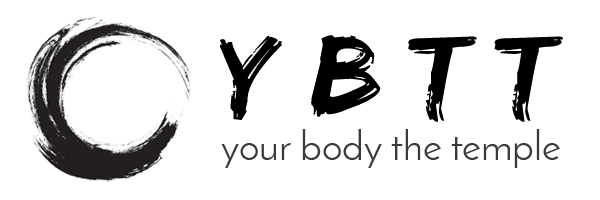
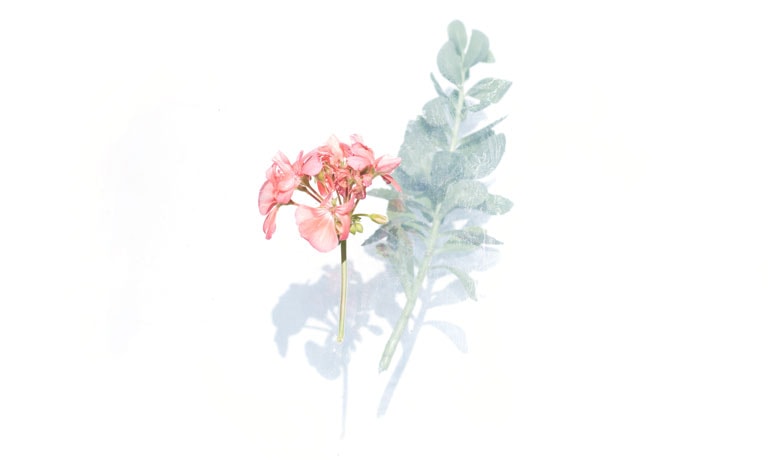
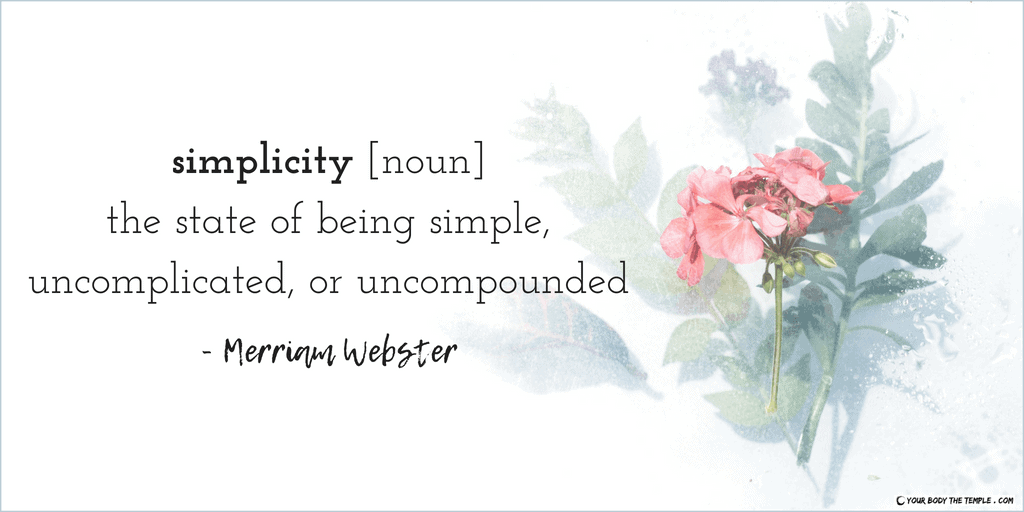
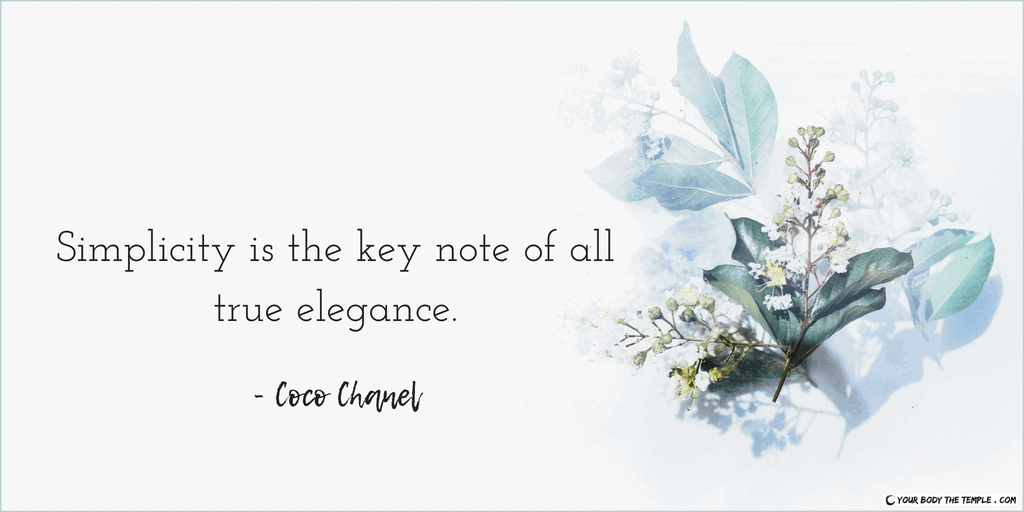
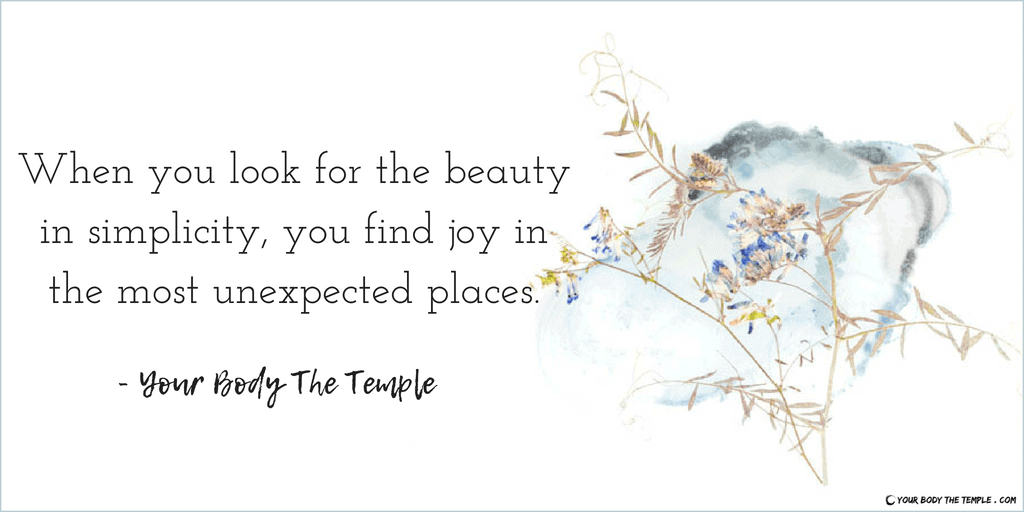

Great article Evie. ????
Thanks so much, Evie!
I was pretty pleased to uncover this page. I wanted to thank you for ones time for this particularly fantastic read!!
I definitely enjoyed every bit of it and I have you book-marked to look at new things in your blog.
This is very interesting, You are a very skilled blogger.
I’ve joined your feed and look forward to seeking more of your great post.
Also, I’ve shared your site in my social networks!
Pretty nice post. I just stumbled upon your weblog and wanted to say that I’ve truly enjoyed surfing around your blog posts.
After all I’ll be subscribing to your rss feed and I hope
you write again very soon!
I like the helpful info you provide in your articles.
I’ll bookmark your weblog and check again here regularly.
I am quite certain I will learn many new stuff right
here! Good luck for the next!
magnificent points altogether, you just won a new reader.
What would you recommend in regards to your publish that you just made a few days ago?
Any positive?
Thank you, very nice post.
This is the first time I frequented your website page and so far? I’m amazed with the analysis you made. Fantastic!
Interesting. After having my house burn down this was a radical lesson. I still catch myself trying not to buy into more as propaganda would suggest that I do. Even when re-building I didn’t build bigger I built smaller. My hope is to re-sell buy land and build tiny as well as off grid and truly live for the first time in my life.
* sorry I didn’t build smaller; I meant smarter. 😉
You have some really good articles. Thnx for sharing!
Its like you read my mind! You appear to know a lot about this, like you
wrote the book in it or something. I think that you can do with some
pics to drive the message home a little bit, but instead of that, this is magnificent
blog. A great read. I will definitely be back.